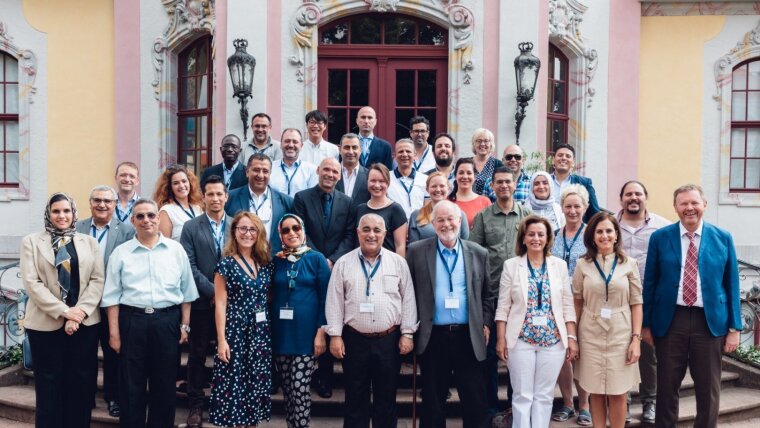
Team_Dr. Luis Peña
Image: Team_Dr. Luis PeñaMETHODOLOGICAL TOOLS FOR RESEARCHING RECONCILIATION
Start 7 May 2021, 14:00 - End16 July 2021, 17:00
Type of eventTeaching Activit Dr. Luis Peña
Email: luis.b.pena@uni-jena.de
Phone: 03641-942784
Room: Leutragraben 1, Level 15 (JenTower)
Module: BA RW3; DB ST; The B8; The B9; The B9.1; The KG / ST1; The L8; The L8.1
It is a theoretical-practical research seminar aimed at learning about the main research methods used in reconciliation studies. In the seminar, the doctoral researchers will know, discuss, and critically incorporate research tools into their projects. In this theory-practical seminar, the doctoral researchers will become familiar with the various sources of information and research tools used in reconciliation studies.
The tools and methodological issues are discussed in three main sections.
- Desk work in reconciliation research.
- Fieldwork and gathering data.
- Some methodological debates
For the development of the seminar has been designed a series of workshops to employ tools ranging from desk work to writing text. Two objectives aim to fulfill the practical exercises. Firstly, to discuss and contrast the methodological approaches used in reconciliation studies. Secondly, to debate many concepts associated with the research in peace and reconciliation studies (ethics of research, participatory action research, reflexivity, intersectionality, social representation, discourse, semiotics, hermeneutics, performance and performativity, agency and actants, etc.).
THEMES
DESK WORK IN RECONCILIATION RESEARCH
1. The workflow and the second brain: tools for taking notes, managing references, collecting data, and linking thoughts. 05/07/21
Readings
- Charmaz, K. (2014). Constructing Grounded Theory. LEGEND. Coding in Grounded Theory Practice. pp 42-71
- Joseph Maxwell and Margaret Chmiel Notes Toward a Theory of Qualitative Data Analysis, in Flick, Uwe. The SAGE Handbook of Qualitative Data Analysis. SAGE, 2013. pp 21-34
- Maggie MacLure, Classification or Wonder? Coding as an Analytic Practice in Qualitative Research In “Coleman, Rebecca. Deleuze and Research Methodologies ”. Edinburgh University Press, 2013. Pp 164-183
2. Operationalizing different concepts of reconciliation. How to measure reconciliation from liberal, moral, agonistic and interdependence perspectives? 05/14/21
Readings
- Pearson, T. (2019). New Directions in Peacebuilding Evaluation. Rowman & Littlefield International. Part I. Taking stock
- Du Toit, F. (2018). When Political Transitions Work: Reconciliation as Interdependence. Oxford University Press.
- Philpott, D. (2012). Just and Unjust Peace: An Ethic of Political Reconciliation. Oxford University Press Oxford.
- Schaap, A. (2009). Law and Agonistic Politics. Ashgate Publishing, Ltd.
3. Holderlin Perspective of Reconciliation. The elements and the levels for assessing reconciliation in the middle of the conflict. 05/21/21
Readings
- Martin Leiner, Conclusion: From Conflict Resolution to Reconciliation. PP 175-186 in Leiner, Martin, and Christine Schliesser. Alternative Approaches in Conflict Resolution. Springer, 2017.
- Korostelina, Karina & Benedicto, Kelly, 2021. Understanding Reconciliation in Nagorno-Karabakh Conflict in the Leiner's Framework of Reconciliation Practices. In Reconciliation, Ethics, Religion Festschrift for Martin Leiner. JCRS
4. Sources for reconciliation studies. From the techniques for data mining to the different sources used to investigate reconciliation (objects, maps, stories, documents, letters, literature-novels, paintings, cinema, monuments, memorial, religious texts, etc.). 05/28/21
Readings
- Hoglund, K., & Oberg, M. (2011). Understanding Peace Research: Methods and Challenges. Taylor & Francis. Part II Evaluating information.
- Banks, Marcus. Using Visual Data in Qualitative Research. Sage, 2018.
- Kindon, Pain, et al. Participatory Action Research Approaches and Methods: Connecting People, Participation and Place. Routledge, 2007. Chapter17. Participatory theater: 'creating a source for staging an example' in the USA // Chapter18 Photovoice: insights into marginalization through a 'community lens' in Saskatchewan, Canada. 19 Uniting people with place using participatory video in Aotearoa / New Zealand: aNgªti Hauiti journey.
FIELDWORK AND GATHERING DATA
5. Differences and complementarities of questionnaires, interviews, life stories, and oral history. How to decide when to use one tool or a combination of them in reconciliation studies? 06/04/21
Readings
- Bretherton, Diane, and Siew Fang Law. Methodologies in Peace Psychology: Peace Research by Peaceful Means (Vol. 26). Cham, Switzerland. Jumper. 2015. Approaches to Narrative Analysis: Using Personal, Dialogical and Social Stories to Promote Peace 275
- Neale, Bren Time and the lifecourse: perspectives from qualitative longitudinal research. pp 25-42, in Worth, Nancy, and Irene Hardill. Researching the Lifecourse: Critical Reflections from the Social Sciences. Policy Press, 2015.
- Brounéus, Karen, In-depth Interviewing. The process, skill and ethics of interviews in peace research. PP 130-145. In Hoglund, K., & Oberg, M. (2011). Understanding Peace Research: Methods and Challenges. Taylor & Francis.
- Seidman, Irving. Interviewing as Qualitative Research: A Guide for Researchers in Education and the Social Sciences. Teachers College Press, 2006. Chapter 2. A Structure for In-depth, Phenomenological Interviewing. Chapter 7. Interviewing as a Relationship
6. Focus groups in reconciliation studies. When to incorporate this methodology, its design, types, and dynamics of the focus groups? 06/11/21
Readings
- Söderström, Johanna, Focus Groups: Safety in numbers? Pp 146-164 in Hoglund, K., & Oberg, M. (2011). Understanding Peace Research: Methods and Challenges. Taylor & Francis.
- Krueger, Richard A. Focus Groups: A Practical Guide for Applied Research. SAGE Publications, 2014. Chapter 1. Overview of focus groups.
- Hennink, Monique M. Understanding Focus Group Discussions. OUP USA, 2014. Chapter 2 and 3. PP 26-126
7. Observation and ethnographic methods: types, activities during the observation, and fieldwork notes. 18.06.21
Readings
- Millar, G. (2017). Ethnographic Peace Research: Approaches and Tensions. Springer.
- Lune, Howard, and Bruce L. Berg. Qualitative Research Methods for the Social Sciences. Pearson, 2017. Ethnographic Field Strategies. PP 107-135
- Musante, Kathleen, and Billie R. DeWalt. Participant Observation: A Guide for Fieldworkers. Rowman Altamira, 2010. Chapter 1 and Chapter 7.
- Angrosino, Michael. Doing Ethnographic and Observational Research. SAGE, 2007.
8. Analysis of qualitative data for the study of reconciliation. Complementarities and differences between Content analysis, textual analysis, discourse analysis, and mapping controversies. 25.06.21
Readings
- Latour, B. (2005). Reassembling the social: An introduction to actor-network-theory. Oxford University Press. Introduction: How to Resume the Task of Tracing Associations pp 1-20
- Verdoolaege, Annelies. Reconciliation Discourse: The Case of the Truth and Reconciliation Commission. John Benjamins Publishing, 2008. Chapter 3. The TCR Archive.
- Gibbs, Graham R. Using Software in Qualitative Analysis, 277-294 in Flick, Uwe. The SAGE Handbook of Qualitative Data Analysis. SAGE
- Rapley, Tim. Doing Conversation, Discourse and Document Analysis. SAGE, 2018.
- Deleuze, Seminar on Foucault. Knowledge. Lecture 1 to 4. https://deleuze.cla.purdue.edu/seminars/foucault/lecture-01External link
SOME METHODOLOGICAL DEBATES
9. Decolonial thought and Participatory Action Research. Lesson for reconciliation studies 02.07.21
Readings
- Wimpenny, Katherine, Participatory action research: an integrated approach towards professional practice development 89-99 . In In Savin-Baden, Maggi, and Claire Howell Major. New Approaches to Qualitative Research: Wisdom and Uncertainty. Routledge, 2010.
- Bretherton, Diane, and Siew Fang Law. Methodologies in Peace Psychology: Peace Research by Peaceful Means (Vol. 26). Cham, Switzerland. Jumper. 2015. Participatory Action Research as a Resource for Community Regeneration in Post-conflict Contexts 237
- de Sousa Santos, Boaventura. Epistemologies of the South: Justice against Epistemicide. Routledge, 2015. Part II. Toward Epistemologies of the South: Against the Waste of Experience
- Kindon, Pain, et al. Participatory Action Research Approaches and Methods: Connecting People, Participation and Place. Routledge, 2007. Chapter 1. Participatory Action Research: origins, approaches and methods. Chapter 21. Participatory data analysis.
10. Gender and Intersectionality in Reconciliation and Peace Studies. 07/09/21
Readings
- Seedat, M., Suffla, S., & Christie, DJ (2017). Emancipatory and Participatory Methodologies in Peace, Critical, and Community Psychology. Jumper.
- McLeod, L and O'Reilly, MF (2019) Critical peace and conflict studies: feminist interventions. Peacebuilding, 7 (2). pp. 127-145. ISSN 2164-7259 DOI: https://doi.org/10.1080/21647259.2019.1588457External link
- Väyrynen, Tarja, et al. Routledge Handbook of Feminist Peace Research. Routledge, 2021. Chapter 1 Genealogies of feminist peace research: themes, thinkers, and turns 17 Annick TR Wibben. // Chapter 3 Methodologies for feminist peace research 40 Annika Björkdahl and Johanna Mannergren Selimovic
- Fraser, Nancy. Scales of Justice: Reimagining Political Space in a Globalizing World. John Wiley & Sons, 2013. Introduction and chapter 1 Scales of justices. Chapter 9. Politics of framing
11. Spatial and ecological turn in social sciences. The inception of theories of social space in peace and reconciliation studies. 07/16/21
Readings
- Megoran, McConnell and Williams Geography and Peace 123-138 in Richmond, Oliver, et al. The Palgrave Handbook of Disciplinary and Regional Approaches to Peace. Springer, 2016.
- Koopman, Sara. " Building an Inclusive Peace Is an Uneven Socio-Spatial Process: Colombia's Differential Approach." Political Geography, vol. 83, 2020, p. 102252.
- Peña, Luis, 2021. The spatiality and the ecology of reconciliation: the territorialization of life. In Religion, ethics, and reconciliation. JCRS.
- Peña, Luis, 2016. Secunormativity: the urban sociability through the everyday practices of surveillance .
- Björkdahl, Annika, and Susanne Buckley-Zistel. Spatializing Peace and Conflict: Mapping the Production of Places, Sites and Scales of Violence , pp. 1–22 in “Spatializing Peace and Conflict: An Introduction.” Palgrave Macmillan UK, 2016.
12. Writing as an ethical conversation: wr iting a qualitative analysis and making the methodological chapter of the dissertation. 07/20/21
Readings
- Colyar, Julia and Holley, Karri Narrative theory and the construction of qualitative texts 70-79. In Savin-Baden, Maggi, and Claire Howell Major. New Approaches to Qualitative Research: Wisdom and Uncertainty. Routledge, 2010.
- Merriam, Sharan B. The methodology Section of a Qualitative research Study. PP 293-300 In Merriam, Sharan B., and Elizabeth J. Tisdell. Qualitative Research: A Guide to Design and Implementation. John Wiley & Sons, 2015.
